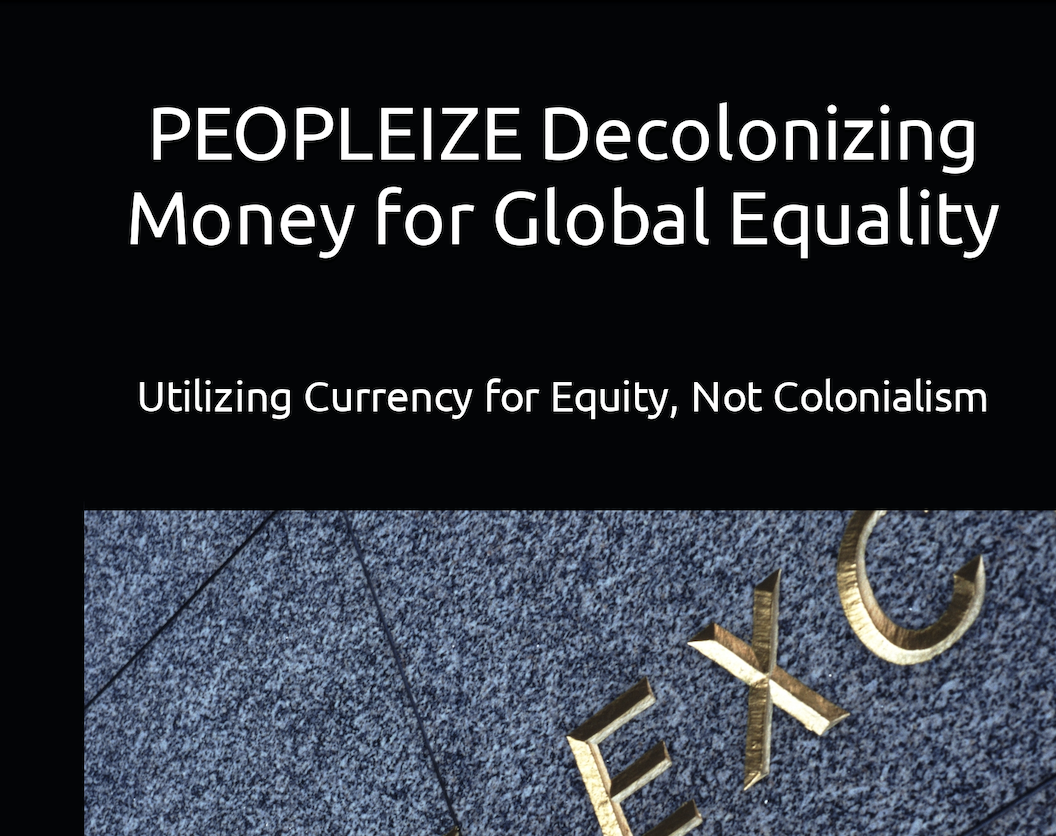PEOPLEIZE
Chapter 1
Decolonizing Money for Global Equality
Utilizing Currency for Equity,
Not Colonialism
By PEOPLEIZE
PEOPLEIZE
Copyright ©
All rights reserved.
Our books may be used in bulk for promotional, educational, or business use. Please contact your local bookseller or us directly at info@peopleize.world
www.peopleize.world
Originally published 69002024
Dedication
In solemn remembrance and heartfelt tribute, this book is dedicated to the over 10,000 Palestinian Children massacred by merciless onslaught of the Israeli military of the Palestinian people in the Genocide of Gaza during just the first 100 days. Their innocent lives, marked by unwarranted suffering and unimaginable loss, serve as a poignant reminder of the profound human cost of conflict.
May the collective cry’s of these young innocent Children echo through the pages of this book, resonating across the globe, and inspiring a universal call for a stop to all wars, violence and all people’s of earth to live in peace. In dedicating these words to the precious lives murdered, we aspire to ignite a transformative conversation about the imperative need to abandon violence as a means of resolving our differences.
May the memories of the Palestinian children be a catalyst for change, motivating people worldwide to seek paths to dialogue, diplomacy, and comprehensive peace with each other. In their honor, let us unite in our commitment to building a world where conflicts are resolved through courts of law, cooperation, and a shared vision of peaceful coexistence. May their legacy be a guiding light, urging us all to work tirelessly towards a future where every child can grow and thrive in a world free from the shadows of violence and war.
Contents
Chapter I: Decolonizing from the Shackles of Financial Colonialism
Chapter II: Rethinking Money for a Sustainable World
Chapter III Redefining the logic and value of Money
Chapter I
Decolonizing from the Shackles of Financial Colonialism
Financial colonialism, deeply entrenched in history, finds its origins in the era of European colonial expansion. Colonial powers not only sought to exploit the abundant natural resources and labor of colonized territories but also imposed financial systems designed to serve their imperial interests. This historical backdrop is essential for comprehending the enduring legacy of financial colonialism and its modern-day manifestations. In contemporary contexts, financial colonialism persists through various mechanisms, shaping the economic landscapes of nations formerly subject to colonization. Defined as the exploitation and domination of economic systems by external powers, financial colonialism continues to exert influence through mechanisms such as debt dependency, currency manipulation, and unequal trade relationships. At the heart of this exploitation lies the use of paper money as a tool of post-colonial control, symbolizing economic subjugation and dependency for many nations. Its impact extends beyond transactions, shaping entire economic structures and perpetuating systems of inequality and injustice. In this chapter, we delve into the historical context of financial colonialism, explore its contemporary manifestations, and analyze the profound implications of paper money as a tool of post-colonial control.
Historical Context of Financial Colonialism:
The historical context of financial colonialism reveals a systematic imposition of colonial financial systems by European powers on colonized territories, exemplifying a stark manifestation of economic exploitation. Colonial rulers leveraged financial structures as a means to extract wealth from colonies, consolidating their dominance and accruing riches at the expense of indigenous populations. One poignant example of this exploitation is the British Empire’s imposition of the Sterling Area system across its colonies, which tied their currencies to the British pound, effectively ensuring economic subservience to the empire. In addition, the Dutch East India Company’s control over the currency systems in its colonies in Southeast Asia exemplifies how financial structures were used to solidify colonial control and siphon resources back to the imperial center.
The introduction of paper money emerged as a pivotal tool in this process of economic subjugation, facilitating the seamless flow of resources from colonies to colonial powers. Traditional currencies indigenous to colonized territories were supplanted by colonial currencies, often backed by the economic and military might of the ruling empire. For instance, during the Scramble for Africa in the late 19th century, European colonial powers introduced their own currencies in African colonies, displacing existing monetary systems and exerting control over local economies. This transition not only facilitated economic exploitation but also systematically eroded local autonomy and sovereignty, further entrenching colonial dominance.
Furthermore, the imposition of colonial financial systems had far-reaching implications for indigenous economies and societies. The forced integration of colonized territories into global economic networks through colonial currencies disrupted traditional economic practices and trading systems. For example, in India, the British colonial administration imposed the British pound as the official currency, displacing indigenous monetary systems and undermining local economic autonomy. This imposition led to widespread economic dislocation and social upheaval, exacerbating poverty and inequality among indigenous populations. Similarly, in the Caribbean, colonial powers imposed plantation economies and enforced a system of debt bondage, where indigenous populations were forced to use colonial currencies to repay debts owed to colonial authorities, perpetuating cycles of economic dependency and exploitation.
The historical context of financial colonialism underscores the systemic nature of economic exploitation by colonial powers and highlights the enduring legacy of colonial financial systems in shaping post-colonial economic landscapes. The introduction of paper money as a tool of economic control played a central role in facilitating this exploitation, amplifying the economic disparities and injustices inflicted upon colonized peoples.
In Africa, particularly in regions formerly under French colonial rule, the legacy of financial colonialism persists through a unique system known as the “Franc Zone” or “Franc CFA” (Communauté Financière Africaine). Established during the colonial era and maintained after independence, the Franc Zone comprises fourteen African countries that use the CFA franc as their currency. These countries include Benin, Burkina Faso, Guinea-Bissau, Ivory Coast, Mali, Niger, Senegal, Togo, Cameroon, Central African Republic, Chad, Republic of Congo, Equatorial Guinea, and Gabon.
The Franc CFA system traces its origins to the French colonial administration’s imposition of the CFA franc as the official currency in its African colonies. Initially pegged to the French franc, and later to the euro, the CFA franc is issued and guaranteed by the French Treasury. This arrangement effectively ties the monetary policy of Franc Zone countries to that of France, limiting their ability to pursue independent monetary policies tailored to their economic needs.
Critics argue that the Franc CFA system perpetuates a form of financial colonialism, whereby African countries are deprived of monetary sovereignty and forced to prioritize the interests of the French Treasury over their own economic development. The pegging of the CFA franc to the euro, coupled with stringent currency convertibility requirements, restricts the ability of Franc Zone countries to devalue their currencies to boost exports or stimulate economic growth. Additionally, the requirement for Franc Zone countries to deposit a portion of their foreign exchange reserves with the French Treasury further undermines their economic autonomy and hampers their ability to respond to external shocks.
Moreover, the Franc CFA system has been criticized for perpetuating unequal trade relationships between African countries and France, whereby former colonial powers benefit from preferential access to African markets and resources. This arrangement has been likened to a form of “neocolonialism,” whereby African countries remain economically dependent on their former colonial masters.
Despite these criticisms, proponents of the Franc CFA system argue that it provides stability and credibility to the currencies of Franc Zone countries, thereby fostering investor confidence and promoting economic integration within the region. However, calls for reforming or dismantling the Franc CFA system have grown louder in recent years, with some African leaders advocating for greater monetary autonomy and the establishment of a common African currency free from external control.
Modern Manifestations of Financial Colonialism:
In contemporary times, financial colonialism persists through various channels, perpetuating economic inequality and dependency in post-colonial nations. Central to this phenomenon is the manipulation of paper money, which serves as a tool of control by external powers. Central banks, often influenced by global financial institutions, wield significant power over monetary policy, shaping economic conditions in post-colonial nations. For instance, in many African countries, the monetary policy decisions of central banks are heavily influenced by former colonial powers or international financial institutions, such as the International Monetary Fund (IMF) or the World Bank. This influence often manifests in the form of conditional loans and policy prescriptions imposed by these institutions as a condition for financial assistance or debt relief. As a result, central banks in post-colonial nations may find themselves compelled to adopt monetary policies dictated by external actors, even if these policies are not aligned with the country’s long-term economic interests.
These external pressures often prioritize objectives such as price stability, fiscal austerity, and currency stability, which may conflict with the broader developmental goals of post-colonial nations. For example, under IMF and World Bank programs, African countries may be required to implement tight monetary policies aimed at curbing inflation and stabilizing exchange rates. While these policies may benefit foreign investors and creditors by enhancing macroeconomic stability, they can also constrain domestic investment, hinder job creation, and exacerbate poverty and inequality.
Furthermore, the influence of former colonial powers on monetary policy decisions may perpetuate historical patterns of economic exploitation and dependency. Post-colonial nations may continue to rely on former colonial powers for technical assistance, training, and expertise in central banking and monetary policy, reinforcing asymmetrical power dynamics in the global financial system. This reliance can undermine efforts to develop indigenous capacity and promote economic self-sufficiency, perpetuating a cycle of dependency on external actors for economic governance.
The dominance of former colonial powers and international financial institutions in shaping monetary policy decisions can undermine the sovereignty of post-colonial nations and limit their ability to pursue independent economic strategies. African central banks may face pressure to prioritize the interests of foreign investors and creditors over the welfare of their own citizens, sacrificing long-term development objectives in favor of short-term financial stability.
In this way, the influence of former colonial powers and international financial institutions on monetary policy decisions in African countries underscores the persistence of financial colonialism in the post-colonial era. Addressing this influence requires efforts to strengthen domestic institutions, enhance policy autonomy, and promote inclusive decision-making processes that prioritize the interests of local communities and promote sustainable development.
Currency manipulation is another prominent feature of modern financial colonialism, contributing to economic disparities and perpetuating dependency in post-colonial nations. External powers may manipulate exchange rates or impose fixed currency regimes that favor their own economic interests, thereby limiting the ability of post-colonial nations to pursue independent monetary policies. This manipulation can result in overvaluation or undervaluation of domestic currencies, adversely affecting trade balances and hindering economic development.For example, the Asian Financial Crisis of the late 1990s vividly exposed the vulnerabilities of countries like Thailand and Indonesia to speculative attacks on their currencies, thereby highlighting the detrimental impact of currency manipulation on post-colonial economies. During this crisis, speculative investors targeted the currencies of these Southeast Asian nations, triggering a rapid and severe depreciation in their exchange rates. This sudden currency devaluation sparked a chain reaction of economic turmoil, leading to sharp declines in asset prices, widespread bankruptcies, and severe economic recessions across the region.
The roots of the Asian Financial Crisis can be traced back to structural weaknesses in the financial systems of these countries, compounded by external factors such as currency manipulation and speculative attacks. In the years preceding the crisis, Thailand and Indonesia had experienced rapid economic growth fueled by large inflows of foreign capital and excessive lending by domestic banks. However, these booms were built on fragile foundations, characterized by weak regulatory oversight, excessive corporate borrowing, and unsustainable asset price inflation.
As the vulnerabilities of their financial systems became apparent, speculative investors seized upon perceived weaknesses in these economies to mount attacks on their currencies. Utilizing sophisticated financial instruments and leveraging their market dominance, these investors engaged in massive short-selling of Thai baht and Indonesian rupiah, triggering a collapse in their exchange rates. The sudden depreciation of their currencies undermined investor confidence, leading to capital flight, banking crises, and sovereign debt defaults.
The consequences of the Asian Financial Crisis were profound and far-reaching, affecting millions of people and exposing the fragility of post-colonial economies in the face of external shocks. In Thailand and Indonesia, the crisis resulted in soaring unemployment, widespread poverty, and social unrest, as businesses collapsed, banks failed, and government revenues plummeted. The crisis also had spill-over effects on neighboring countries in the region, exacerbating economic instability and undermining regional integration efforts.
Moreover, the Asian Financial Crisis laid bare the detrimental impact of currency manipulation and speculative attacks on post-colonial economies, highlighting the urgent need for reforms to strengthen financial regulation, enhance macroeconomic stability, and promote sustainable development. In response to the crisis, affected countries implemented far-reaching economic reforms, including measures to strengthen banking supervision, liberalize capital markets, and diversify their economies. These reforms, while painful in the short term, helped to rebuild confidence, restore stability, and lay the foundations for more resilient and inclusive economic growth in the long term.
Debt dependency is a significant mechanism through which financial colonialism perpetuates economic subjugation in post-colonial nations. Many post-colonial countries, burdened by external debts accumulated during the colonial era or through loans from international financial institutions, find themselves trapped in cycles of debt repayment. These debts often come with stringent conditions imposed by creditors, such as structural adjustment programs or austerity measures, which further exacerbate poverty and inequality. For instance, countries in Latin America and Africa have grappled with the enduring consequences of debt burdens accumulated during the 1980s debt crisis, constraining their ability to invest in critical social services and infrastructure. The 1980s debt crisis was precipitated by a combination of factors, including excessive borrowing by governments, volatile interest rates, and declining commodity prices, exacerbated by economic mismanagement and political instability in many borrowing nations.
During this period, Latin American and African countries borrowed heavily from international financial institutions and commercial banks to finance ambitious development projects and spur economic growth. However, when global economic conditions deteriorated, and interest rates soared, many of these countries found themselves unable to service their mounting debts. As a result, they were forced to turn to international creditors, such as the International Monetary Fund (IMF) and the World Bank, for emergency assistance and debt restructuring.
The terms of the debt restructuring agreements imposed by international creditors were often stringent, requiring countries to implement painful austerity measures, such as deep cuts to public spending, privatization of state-owned enterprises, and deregulation of financial markets. These austerity measures exacerbated social inequality and contributed to widespread poverty, as governments were forced to prioritize debt repayment over investments in essential social services, such as education, healthcare, and infrastructure.
Furthermore, the debt burdens accumulated during the 1980s debt crisis continue to weigh heavily on the economies of Latin American and African countries, diverting scarce resources away from productive investments and hindering long-term development prospects. Debt service payments often consume a significant portion of government budgets, leaving little room for investment in poverty alleviation programs or infrastructure development. Moreover, the high cost of servicing external debt constrains the ability of these countries to access new financing for much-needed investments in areas such as education, healthcare, and renewable energy.
The cycle of debt and austerity perpetuates a vicious cycle of economic underdevelopment and dependency, as countries remain trapped in a cycle of borrowing and debt repayment, without ever fully escaping the burden of their past debts. Addressing the legacy of the 1980s debt crisis requires a comprehensive approach that includes debt relief initiatives, reforms to strengthen domestic revenue mobilization, and policies to promote sustainable and inclusive economic growth. Additionally, efforts to address the root causes of debt accumulation, such as corruption, weak governance, and unsustainable borrowing practices, are essential to prevent future debt crises and promote long-term economic stability and development.
Unequal trade relationships also contribute to the perpetuation of financial colonialism in post-colonial nations, limiting their economic agency and exacerbating dependency on external powers. Post-colonial countries often find themselves locked into exploitative trade agreements that prioritize the interests of former colonial powers or multinational corporations. These agreements may result in the exploitation of natural resources, the stifling of domestic industries, and the perpetuation of economic dependency. For example, the extraction of natural resources such as oil and minerals in many African countries continues to illustrate the enduring legacy of exploitation and economic disparity, where foreign corporations and former colonial powers reap substantial profits at the expense of local communities and sustainable development. Despite possessing vast reserves of valuable natural resources, many African nations remain mired in poverty, inequality, and environmental degradation, as the benefits of resource extraction disproportionately accrue to external actors rather than local populations.
Foreign government and corporations, engage in extractive activities to exploit Africa’s abundant natural wealth for commercial gain. These corporations typically operate under agreements that grant them access to mineral-rich lands or offshore oil reserves, often at the expense of indigenous communities who rely on these resources for their livelihoods. In many cases, these agreements are negotiated behind closed doors, with little transparency or consultation with affected communities, leading to widespread land dispossession, environmental degradation, and social conflict.
Furthermore, the extraction of natural resources in Africa is often characterized by exploitative labor practices, environmental degradation, and human rights abuses. Local communities living in proximity to extractive sites frequently bear the brunt of these adverse impacts, experiencing displacement, loss of livelihoods, and exposure to toxic pollutants. Moreover, the revenue generated from resource extraction is often siphoned off by corrupt officials or elites, rather than being reinvested in local development projects or social welfare programs.
Former colonial powers also play a significant role in shaping the dynamics of resource extraction in Africa, leveraging their economic and political influence to secure favorable terms for resource exploitation. Historical legacies of colonialism, including unequal trade relationships and neocolonial interventions, continue to shape the extractive landscape in Africa, perpetuating patterns of economic dependency and exploitation. Western corporations, backed by their governments, often wield considerable power and influence in negotiating contracts and accessing natural resources in African countries, further marginalizing local communities and hindering sustainable development efforts.
The persistence of extractive industries in Africa highlights the urgent need for reforms to ensure that resource extraction benefits local communities and contributes to sustainable development. This requires greater transparency and accountability in the negotiation of extractive contracts, as well as mechanisms to ensure that revenues from resource extraction are reinvested in local development projects, poverty alleviation programs, and environmental conservation initiatives. Moreover, empowering local communities to participate in decision-making processes related to resource extraction is essential to safeguarding their rights, promoting social justice, and fostering inclusive economic development in Africa.
Despite achieving political independence, many post-colonial nations remain ensnared in a cycle of economic subjugation perpetuated by the legacy of financial colonialism. The manipulation of paper money, currency manipulation, debt dependency, and unequal trade relationships continue to limit the economic agency and sovereignty of these nations, hindering their efforts to achieve sustainable development and economic justice. Addressing the modern manifestations of financial colonialism requires concerted efforts to reform global financial systems, promote economic empowerment, and foster genuine partnerships based on mutual respect and equity.
Impact of Paper Money as a Tool of Post-Colonial Control:
Paper money, introduced by colonial powers to replace traditional currencies, has entrenched itself as a symbol of economic subjugation and dependency for many post-colonial nations. Its introduction was often accompanied by policies that favored the interests of colonial powers and external creditors over the economic well-being of local populations, shaping economic structures and perpetuating systems of inequality and injustice.
One significant aspect of paper money’s impact is its control by external powers, a dynamic that severely limits the monetary sovereignty of affected nations. Central banks in post-colonial countries often find themselves subject to the monetary policies dictated by former colonial powers or international financial institutions, such as the IMF or World Bank. This lack of autonomy effectively undermines the ability of these nations to pursue independent economic strategies that are tailored to their specific needs and circumstances.
For example, many African countries that were formerly colonized by European powers continue to grapple with the legacy of colonial monetary systems that were designed to serve the interests of the colonial rulers. The Franc Zone, comprising countries that use the CFA franc as their currency, exemplifies this lack of monetary sovereignty. The CFA franc is pegged to the euro and guaranteed by the French Treasury, effectively tying the monetary policy of these countries to that of France. As a result, these countries have limited control over their own monetary policies and are unable to independently address economic challenges such as inflation or currency devaluation.
Similarly, in Latin America, countries that were subjected to neoliberal economic policies imposed by international financial institutions in the 1980s and 1990s continue to struggle with limited monetary sovereignty. These policies, often prescribed as conditions for receiving loans or debt relief, emphasized fiscal austerity, deregulation, and privatization. While these measures were intended to promote economic stability and growth, they often had detrimental effects on local economies, leading to increased inequality, unemployment, and social unrest.
Furthermore, the influence of international financial institutions such as the IMF and World Bank extends beyond policy prescriptions to encompass broader economic governance frameworks. Many post-colonial nations are required to adhere to international monetary standards and reporting requirements set by these institutions, further constraining their ability to implement independent monetary policies. This lack of autonomy not only undermines the sovereignty of these nations but also perpetuates systems of economic dependency and exploitation inherited from the colonial era.
The control of paper money by external powers represents a significant barrier to the monetary sovereignty of post-colonial nations. This lack of autonomy limits the ability of these nations to pursue independent economic strategies and address the unique challenges they face. To overcome this legacy of economic control and exploitation, post-colonial nations must assert their sovereignty and pursue policies that prioritize the well-being and development of their own
The devaluation of local currencies, driven by external influences, further exacerbates economic disparities within post-colonial societies. Devaluation reduces the purchasing power of local currencies, making imported goods more expensive and fueling inflation. This inflation disproportionately affects low-income individuals and vulnerable populations, who are least able to absorb the rising costs of essential goods and services. Moreover, devaluation can undermine confidence in the local currency, leading to capital flight and exacerbating economic instability.
Furthermore, the use of paper money as a means of debt repayment perpetuates cycles of indebtedness and economic exploitation in post-colonial nations. Many of these countries accumulate significant levels of external debt, often incurred during the colonial era or through loans from international financial institutions. The repayment of these debts, denominated in foreign currencies, places a heavy burden on the economies of post-colonial nations, diverting resources away from essential social services and infrastructure development. Moreover, debt repayment often comes with stringent conditions imposed by creditors, such as austerity measures and structural reforms, which further undermine economic sovereignty and exacerbate social inequalities.
Examples abound of how paper money has been used as a tool of post-colonial control in various contexts. For instance, in Zimbabwe, hyperinflation driven by mismanagement of the currency and excessive money printing led to economic collapse and widespread social upheaval in the early 2000s. The Zimbabwean government, under President Robert Mugabe, resorted to printing money to finance unsustainable government spending, leading to hyperinflation rates that reached astronomical levels. Prices skyrocketed, the value of the Zimbabwean dollar plummeted, and the economy spiraled into chaos. Basic necessities became unaffordable for the average citizen, unemployment soared, and social services collapsed. The hyperinflation crisis in Zimbabwe serves as a stark reminder of the devastating consequences of unchecked money printing and economic mismanagement.
Similarly, in Argentina, currency devaluation and debt default during the 2001 economic crisis resulted in severe social unrest and political instability. Argentina, once hailed as an economic success story in the 1990s for its adherence to a fixed exchange rate regime pegged to the US dollar, experienced a dramatic reversal of fortune when the government defaulted on its external debt and abandoned the currency peg. The devaluation of the Argentine peso led to widespread impoverishment, as savings evaporated overnight and businesses collapsed. Riots broke out across the country, and successive governments struggled to restore stability and confidence in the economy. The Argentine economic crisis of 2001 serves as a cautionary tale of the dangers of unsustainable currency regimes and the perils of excessive debt accumulation.
In the upcoming chapter, we will delve into the transformative potential of the “peopleize” approach, which prioritizes people over profit, to revolutionize the existing money system and liberate individuals worldwide from the constraints imposed by artificially created mechanisms. The essence of the peopleize approach lies in its fundamental principle of placing the well-being and empowerment of individuals and communities at the forefront of economic decision-making, rather than prioritizing the accumulation of wealth and power by a privileged few.
By adopting a peopleize approach, societies can fundamentally reshape the dynamics of the money system to serve the interests of the broader populace, rather than perpetuating systems of exploitation and inequality. This paradigm shift involves reorienting the objectives of monetary policy and financial institutions towards promoting social justice, equitable wealth distribution, and sustainable development. Rather than allowing money to be wielded as a tool of control and domination by entrenched interests, the peopleize approach advocates for democratizing access to financial resources and empowering individuals to actively participate in shaping economic outcomes.
One of the key pillars of the peopleize approach is the recognition of money as a social construct that should serve the common good, rather than as a means of enriching a select few. By challenging the prevailing notion of money as a scarce commodity to be hoarded and controlled, societies can unlock its transformative potential as a tool for fostering economic justice and collective prosperity. This entails reimagining monetary systems based on principles of solidarity, cooperation, and mutual aid, rather than competition and exploitation.
Moreover, the peopleize approach emphasizes the importance of community-driven initiatives and grassroots movements in effecting meaningful change within the money system. By fostering participatory decision-making processes and decentralized forms of economic organization, communities can reclaim agency over their financial destinies and challenge the dominance of corporate interests and financial elites. This bottom-up approach to economic empowerment empowers individuals to become active agents of change in shaping the future of the money system.
In the chapters ahead, we will explore concrete strategies and examples of how the peopleize approach can be implemented to transform the money system and create a more just and equitable world for all. From community banking initiatives and alternative currencies to participatory budgeting and wealth redistribution policies, the peopleize approach offers a blueprint for building a more inclusive and democratic economy that prioritizes the needs and aspirations of ordinary people over the pursuit of profit and power. Through collective action and solidarity, we can harness the transformative potential of the peopleize approach to build a future where everyone has the opportunity to thrive and flourish.





